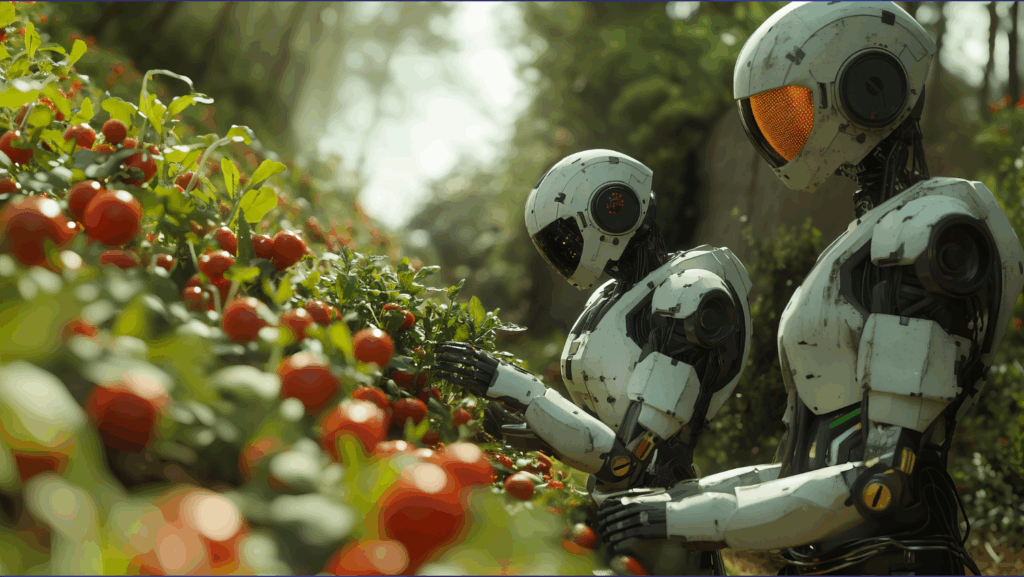The global population is growing rapidly, placing increasing pressure on farmers to produce more food while managing the risks posed by climate change.
Extreme weather, water scarcity, and pest outbreaks are just some of the challenges affecting agricultural productivity.
Artificial intelligence (AI) is emerging as a transformative solution for modern farming.
According to GlobeNewswire, AI has the potential to increase global agricultural productivity by up to 20%, and the market is projected to grow from USD 2.4 billion in 2025 to USD 3.0 billion in 2026, with every segment of AI-driven agriculture showing rising revenues.
So, in this blog, we will explore how AI is transforming agriculture, from precision farming and automated operations to crop monitoring, livestock management, and sustainable practices.
Why AI Matters in Agriculture
The global demand for food is rising rapidly, yet traditional farming methods often struggle to keep pace. Manual crop monitoring, seasonal dependence, and limited insights into soil and weather can lead to lower yields and inefficient resource use.
Climate change further compounds these challenges, with extreme weather, droughts, and pest outbreaks affecting productivity. In this scenario, AI offers a data-driven solution, enabling farmers to make informed decisions, improve yields, and reduce costs.
How AI adds value:
-
Precision agriculture: Tailoring irrigation, fertilisation, and crop care to field-specific conditions.
-
Predictive analytics: Forecasting weather, pests, and yields for better planning.
-
Automation & monitoring: Using AI-powered sensors and drones for real-time crop insights.
-
Sustainability: Reducing resource waste and promoting eco-friendly practices.
By adopting AI, farmers can improve efficiency, resilience, and sustainability. Next, we will explore the key AI applications in farming that are transforming agriculture today.
Key AI Applications in Farming
a) Precision Agriculture
Precision agriculture uses AI-powered sensors, drones, and satellite data to monitor soil conditions, water levels, and crop health in real time.
This approach allows farmers to:
-
Optimise irrigation and fertilisation according to the specific needs of each field, reducing water and input waste.
-
Manage pests and diseases precisely, minimising chemical usage and environmental impact.
-
Predict crop yields accurately, enabling better planning for harvesting and market supply.
b) Automated Farming
Automation is transforming labour-intensive tasks through AI-driven machinery.
Autonomous tractors, harvesters, and drones can perform planting, weeding, and harvesting with minimal human intervention. This leads to:
-
Significant reduction in manual labour and associated costs.
-
Greater efficiency and consistency, ensuring timely operations even under challenging conditions.
c) Crop Health Monitoring
AI-powered image analysis tools help farmers detect early signs of crop diseases, pest infestations, and nutrient deficiencies.
By identifying issues at an early stage, farmers can:
-
Implement timely interventions, preventing large-scale crop loss.
-
Reduce dependency on broad-spectrum chemicals, promoting sustainable farming practices.
d) Livestock Management
In livestock farming, AI sensors track animals’ health, behaviour, and feeding patterns.
These insights help farmers:
-
Detect illnesses or stress early, ensuring timely treatment.
-
Optimise feeding and care, improving animal growth and overall herd productivity.
-
Enhance reproductive and behavioural monitoring, supporting efficient herd management.
e) Supply Chain Optimisation
AI is also transforming the agricultural supply chain by providing predictive analytics and operational insights.
This allows farmers and distributors to:
-
Forecast demand accurately and manage inventory efficiently.
-
Optimise logistics and transportation, reducing food waste and ensuring fresh produce reaches markets on time.
-
Improve overall traceability and transparency, building trust in the supply chain.
Tap into our expert talent pool to build cutting-edge AI solutions.
Benefits of AI in Agriculture
1. Increased Productivity
AI technologies streamline labour-intensive tasks and optimise resource use, helping farmers achieve higher efficiency:
-
Automation of tasks: AI-powered robots and drones can handle planting, harvesting, and weeding, reducing manual labour and operational strain.
-
Optimised resource allocation: Analysing data on soil, weather, and crop health enables precise use of water, fertilisers, and pesticides.
-
Real-time monitoring: Sensors and AI analytics allow farmers to respond quickly to changes in crop or soil conditions.
-
Improved workflows: AI coordinates activities across planting, irrigation, and logistics, ensuring smoother farm management.
2. Enhanced Crop Yield and Quality
By leveraging AI, farmers can maximise both the quantity and quality of their produce:
-
Precision interventions: Inputs such as fertilisers and pesticides are applied only where needed, increasing efficiency and yield.
-
Early disease and pest detection: AI-powered image analysis identifies threats at an early stage, reducing crop losses.
-
Optimised irrigation: Smart irrigation systems ensure crops receive the right amount of water at the right time.
-
Quality monitoring: AI tracks nutritional value, ripeness, and texture, helping farmers deliver premium produce.
3. Environmental Sustainability
AI promotes eco-friendly farming practices, helping reduce environmental impact while maintaining productivity:
-
Reduced chemical use: Targeted pesticide and fertiliser application minimises soil and water contamination.
-
Efficient water management: AI-driven irrigation conserves water and prevents overuse.
-
Biodiversity and carbon footprint: Sustainable farming practices supported by AI protect soil health and reduce greenhouse gas emissions.
4. Economic Advantages
Adopting AI in agriculture can improve profitability and market competitiveness:
-
Lower operational costs: Automation reduces labour expenses and resource wastage.
-
Increased revenue: Improved yields and higher-quality crops generate better market returns.
-
Market access: Consistent, high-quality produce opens opportunities in domestic and international markets.
5. Data-Driven Decision Making
AI equips farmers with actionable insights to make informed choices:
-
Risk mitigation: Predictive analytics anticipate weather events, pest outbreaks, and crop disease risks.
-
Optimised resource use: Data helps allocate inputs efficiently and avoid unnecessary expenses.
-
Strategic planning: AI forecasts crop yields, market demand, and operational needs, supporting better long-term decisions.
6. Food Security and Social Impact
AI contributes to global food security and improves rural livelihoods:
-
Increased food production: Higher yields help meet the needs of a growing population.
-
Reduced food waste: Optimised supply chains and storage prevent losses.
-
Improved livelihoods: Efficient and sustainable practices enhance farmer income and community resilience.
Emerging AI Trends in Agriculture
1. AI & Machine Learning
AI and machine learning are enabling predictive and autonomous capabilities that were previously impossible.
By analysing vast datasets from weather, soil, and crop patterns, AI helps farmers anticipate challenges and optimise operations.
These technologies are particularly effective in forecasting crop yields, identifying pest risks, and automating repetitive tasks. Key applications include:
-
Predictive analytics: Forecast weather patterns, pest outbreaks, and crop yields to make proactive decisions.
-
Crop modelling: Use historical and real-time data to optimise planting schedules, irrigation, and fertilisation.
-
Autonomous systems: Robots and AI-driven machinery handle planting, weeding, and harvesting, reducing reliance on manual labour.
2. IoT Integration
The Internet of Things (IoT) is revolutionising how farms collect and use data.
Connected sensors, smart devices, and automated equipment provide farmers with real-time insights into crop and soil conditions.
This integration ensures that decisions are informed by accurate and up-to-date information, enabling more efficient management of resources. Benefits include:
-
Real-time monitoring: Sensors track soil moisture, temperature, and crop health continuously.
-
Remote control: Manage irrigation systems, climate controls, and equipment from a distance, improving efficiency and reducing costs.
3. Drones & Remote Sensing
Drones and aerial imaging are becoming essential tools for modern farming.
They allow farmers to survey large areas quickly and detect problems that are invisible to the naked eye.
High-resolution images and multispectral data help identify pest infestations, nutrient deficiencies, and crop stress early, allowing for precise interventions.
Key uses include:
-
Precision spraying: Targeted application of fertilisers and pesticides minimises waste and environmental impact.
-
Aerial crop monitoring: Detect diseases, pest infestations, and nutrient deficiencies at an early stage to prevent losses.
4. Blockchain Technology
Blockchain is emerging as a powerful tool for transparency and security in the agricultural supply chain.
By recording data in a decentralised, tamper-proof system, farmers and suppliers can track crops from farm to table, ensuring accountability and reducing fraud.
Blockchain also enables secure data sharing between stakeholders, improving collaboration. Key benefits include:
-
Supply chain transparency: Track crops and products through every stage of the supply chain.
-
Secure data sharing: Share agricultural data securely among farmers, suppliers, and distributors.
5. Biotechnology & Genetic Engineering
AI is accelerating innovation in crop and livestock improvement.
By combining AI with biotechnology, farmers can develop crops and animals with enhanced traits, increasing resilience, yield, and nutritional value.
These technologies support sustainable and climate-adaptive farming. Key applications include:
-
Disease-resistant crops: Develop plants that can withstand pests, diseases, and extreme weather conditions.
-
Precision breeding: Customise crops for higher yield, improved nutrition, and drought tolerance using AI-guided genetic engineering.
6. Edge AI
Edge AI is transforming the way agricultural data is processed.
By analysing data locally on devices or sensors, farmers can make faster, real-time decisions without relying on cloud connectivity.
This technology also strengthens data privacy, as sensitive farm information is processed on-site rather than transmitted externally. Key advantages include:
-
Real-time decision-making: Immediate analysis of sensor and IoT data allows quick actions in the field.
-
Enhanced privacy and security: Local processing reduces exposure to data breaches and improves responsiveness.
Also read: 8 Reasons Composable AI Agents are Replacing Traditional IT Systems
The Future of AI in Agriculture
1. Autonomous Farms
Future farms may operate almost entirely autonomously, with AI-powered machinery and robotics performing planting, weeding, harvesting, and monitoring tasks.
These systems will reduce dependence on manual labour and optimise efficiency across all farm operations.
Key aspects include:
-
Full automation of farming tasks for consistent performance.
-
Real-time monitoring and adaptive control of crops and equipment.
2. Highly Precise, Data-Driven Crop Management
AI will enable even more precise management of crops by analysing vast amounts of data from soil sensors, weather forecasts, and satellite imagery.
This approach allows farmers to optimise yields while conserving resources:
-
Tailored irrigation, fertilisation, and pest management for each crop area.
-
Predictive insights for crop rotation, planting schedules, and yield forecasting.
3. AI-Enabled Food Supply Chains
AI will revolutionise agricultural supply chains by ensuring efficient inventory management, reducing waste, and maintaining product quality from farm to table:
-
Predictive analytics to match production with demand.
-
Optimised logistics for timely delivery and minimal spoilage.
4. Synergy with Biotechnology
The combination of AI and biotechnology will accelerate crop and livestock improvement. AI can analyse genetic data to develop traits that increase resilience, yield, and nutritional value:
-
Disease-resistant and climate-resilient crops.
-
Precision breeding of livestock for productivity and health.
5. Personalised Nutrition and Smart Food Production
AI may enable the production of food tailored to individual dietary needs and preferences.
By analysing health data and nutritional requirements, AI-powered systems could guide the cultivation and processing of crops for targeted nutrition:
-
Development of customised food products.
-
Smart farm-to-consumer solutions for health-conscious markets.
6. Ethical and Sustainable AI Adoption
As AI becomes more prevalent, ethical and sustainable practices will be critical to ensure equitable benefits for all farmers and minimal environmental impact:
-
Ensuring access to AI technologies for small and medium-scale farmers.
-
Implementing eco-friendly practices and monitoring environmental effects.
-
Protecting sensitive agricultural and personal data.
Transform Your Farming with AI – How Wow Labz Can Help
Artificial intelligence is reshaping agriculture, offering smarter, more sustainable, and highly efficient farming solutions.
At Wow Labz, we empower farmers, agribusinesses, and food-tech innovators to harness the full potential of AI.
Our team of AI experts specialises in:
-
Developing custom AI solutions for precision farming, crop monitoring, and livestock management.
-
Building smart automation systems for planting, harvesting, and irrigation.
-
Implementing data-driven insights for optimised resource allocation and predictive yield planning.
-
Enhancing supply chain efficiency and food quality through AI-powered analytics.
By partnering with Wow Labz, you can increase productivity, reduce operational costs, and promote sustainable practices across your agricultural operations.
Ready to revolutionise your farm with AI? Contact Wow Labz today and explore the future of smart, data-driven agriculture.





